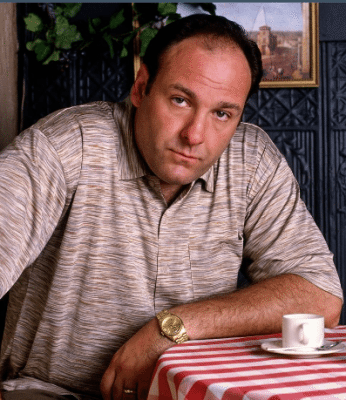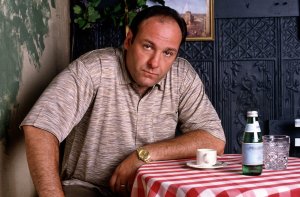Andrew Weber blogs about TV at The Drug of the Nation. Follow him on Twitter and Facebook.
In the light of The Sopranos’ star James Gandolfini’s unfortunate recent passing, and the end of Mad Men’s sixth and penultimate season, there’s no better time to answer the most pressing question concerning those two shows. Who cheated on his wife with more women, Tony Soprano or Don Draper? To find out we’ll dive through the respective sordid pasts of these two legendary television philanderers, going back and forth one-fo-one chronologically between the shows. Because the Sopranos started first, we’ll start with Tony. Apologies if I’ve missed any; I did my best to scour through the episodes of both shows for every affair, no matter how brief, but these two characters didn’t make it easy.
Tony:
Irina Peltsin – One of the two longest extramarital relationships Tony is involved in over the course of the series, Irina is Tony’s comare from the pilot until the second to last episode of the second season when he attempts to break up with her, thinking she deserves to have a real life. She doesn’t take it well, breaking down and trying to kill herself, which will be the start of somewhat of a tradition for Tony’s mistresses. Tony sends Silvio over to her place to give her a nice $75,000 severance package and urge her to move on.
Don:
Midge Daniels – Like Tony, Don Draper is cheating on his wife from the get go. In the first episode we meet the bohemian artist Midge who seems fittingly more reminiscent of the late ‘50s than the ‘60s. Seemingly opposites, they nevertheless have a fairly good run, as one of Don’s longer extramarital affairs, lasting until the eight episode of the first season, when Don unsuccessfully tries to get her to go to Paris with him. Things don’t go well after that for Midge who shows up in a later season as a drug addict.
Tony:
Connie Desapio – Desapio is a receptionist at Barone Construction, a Soprano family operation which Tony spends some time at, based on legal advice to appear like he’s actually doing the job he claims to have. They have sex to pass the time in season two, episode 11, “House Arrest” until Tony goes back to Satriale’s eventually out of boredom.
Don:
Rachel Menken – Rachel, who initially hires the firm to create interest for her department store, was a very different kind of woman from Midge. She meets done in the series’ first episode as a client, and initiaully rebuffs Don’s advances, upon finding out that he’s married. They finally begin the affair in the tenth episode of the first season. She puts the kibosh on the affair in the 12th episode of the first season, when, after Don proposes running away to LA together, she realizes that he just wants to run away, but not necessarily with her.
Tony:
Gloria Trillo – Trillo is a car salesman who Tony meets in Dr. Melfi’s office in season three’s “He is Risen.” The most mentally unstable of Tony’s affairs, which is a dubious honor, she tries to provoke Tony into violent reactions. Tony breaks up with her because of this, and Patsy Parisi threatens her, telling her to never come near Tony or his family again. Later she hangs herself.
Don:
Bobbie Barrett – Barrett, introduced in season two’s “The Benefactor,” is married to and manages insult comic Jimmy Barrett, who Sterling Cooper recruits to appear in ads for Utz potato chips. Barrett is the only woman Don sleeps with that we know is married, and she affirmatively seduces Don, who makes a brief attempt to turn her down. The affair hits an awkward moment when Don and Bobbie are caught in a car accident together, but ends finally when Don finds out Bobbie has been gossiping about him behind his back.
Tony:
Valentina La Paz – La Paz is the other long-time Tony Soprano comare. She’s dating Ralph Cifaretto at the time that Tony and her get together after having lunch at Hesh’s house in season four episode “Mergers and Acquisitions.” Tony breaks up with Valentina towards the end of season five when he arranges to move back in with Carmela, after she suffers a serious burn injury. She, continuing a pattern, threatens to kill herself when he leaves.
Don:
Joy – In season two, episode 11, “The Jet Set”, Don takes a trip out to Los Angeles, where he meets a young woman, Joy, near the pool at his hotel. They attend a surreal dinner party and afterwards have sex. Later, she and her friends and her dad move to the Bahamas, while Don returns to reality in New York.
Tony:
Svetlana Kirilenko – Tony and Kirilenko, earlier comare Irina’s cousin and Junior’s nurse, have sex just once, as far as we know, in season four episode “The Strong, Silent Type.” She is far and away the most put together woman Tony cheats with on the show and she breaks off their relationship, though Irina later spills the beans to Carmela, helping to lead to Tony and Carmela’s separation.
Don:
Shelly – In the first episode of season three, “Out of Town,” Don meets a stewardess named Shelly on a flight to Baltimore. She invites him and Sal to dinner at the hotel at which they’re all staying and after their meal, one thing leads to another.
Tony:
Sonya Aragon – An exotic dancer Chris used to hang out with, Tony meets up with her in Las Vegas after Chris’s death in season six episode “Kennedy and Heidi.” They have sex, smoke weed, and take peyote.
Don:
Suzanne Farrell – Suzanne and Don first meet during a parent teacher conference in the second episode of season three while she’s Sally’s teacher. They meet several times before the relationship becomes romantic. She’s a bit of a hippy, and has a troubled brother who she cares for deeply. She falls for him and wants to go out together in public, something Don almost grants while Betty is out of town. The affair ends when Betty returns early and inquires about Don’s past which causes Don to call Suzanne to let her know it’s over.
Don:
Sylvia Rosen – It seemed like Don had finally become faithful with Megan, but his faith waned at the start of the most recent sixth season when it turns out he’s been having an affair with neighbor Sylvia. This affair was doubly nefarious because Don seemed to actually like Sylvia’s husband Arnold, and there aren’t very many people in Mad Men that Don likes. The affair came to a temporary end when Don was simply too cruel and Sylvia decides it’s over, but is rekindled when Don helps get Sylvia’s son out of serving in Vietnam.
Don:
Betty Francis – Yes, I almost forgot this but Don cheats on his second wife with his first wife.
Don takes a tight 8-6 victory, but with all the other people Don and Tony must have slept with before the shows started, who can possibly say what the actual score might be.
A couple of quick notes on women who were excluded:
This is a comparison of women Don cheated with, so in season four, when he was divorced, all his affairs were on the up and up. Still for completion’s sake, here’s a quick rundown of all the women he slept with in season four. His most ongoing relationship was with the age appropriate Faye Miller, a ratings analyst who he breaks up with at the end of the season when he instead chooses to be with Megan, who he proposes to soon after. In between, he sleeps with a call girl Candace, in the first episode of the fourth season, a secretary named Allison whose heart he breaks in the second episode, a waitress named Doris in the sixth episode as well another unnamed woman, and Roger’s wife’s Jane’s friend Bethany in the eighth episode.
Tony was separated from Carmela for most of the fifth season of The Sopranos, so I chose not to count any sleeping around during the separation. In the 11th episode of the fifth season, “The Test Dream,” he hires an escort while he’s staying at the Plaza, and they presumably sleep together. In the first episode of season four, Tony and his gang party with a bunch of Icelandic stewardesses but there’s no clear evidence indicating Tony necessarily slept with any of them. Tony almost has an affair with real estate agent Juliana Skiff, but they never consummate it as Tony decides to remain faithful to Carmela, and Skiff and Chris take up together instead.









